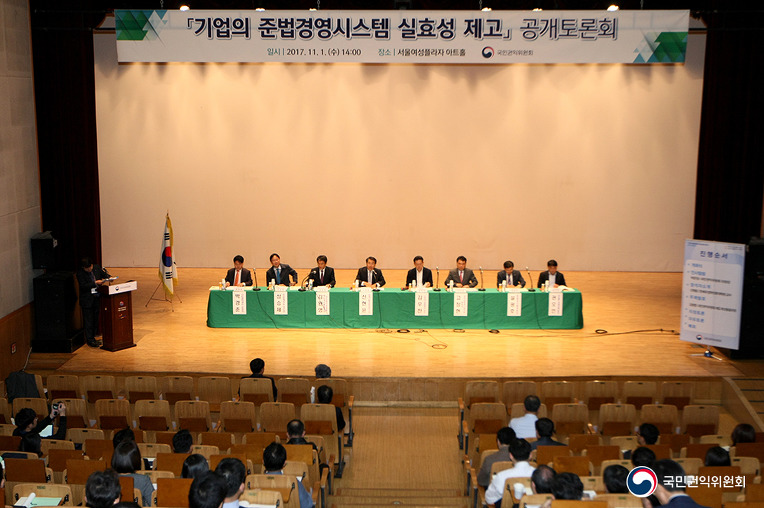News & Publications
Press Release
Seeking ways to strengthen the role of non-executive directors...
- Date2017-11-24
- Hit937
| “Seeking ways to strengthen the role of non-executive directors in overseeing and checking major shareholders and of compliance officers in overseeing any illegal practices of executives and employees” |
| ACRC held an open panel discussion to seek measures to improve the corporate compliance management system
|
| The Anti-Corruption and Civil Rights Commission (ACRC, chairperson Pak Un Jong) held an open panel discussion, which was attended by experts from various fields, on 1st Nov. in order to seek ways to enhance effectiveness in the corporate compliance management system. The corporate compliance management system, including non-executive directors (also called outside directors) and compliance officials, etc., has been first introduced in the aftermath of the 1997 Asian Financial Crisis with a view to increasing transparency in corporate management.
There have been constant criticisms regarding the system of non-executive directors or compliance officials that such a system has not been working properly and thus even regarded as useless for the past 20 years or so since its first introduction after the Asian Financial Crisis hit Korea in 1997.
The ACRC said that the panel discussion was convened to seek measures for reasonable institutional improvement on the existing corruption control system in the private sector by collecting practical opinions of experts from various fields, since there have been many cases of violation or evasion of the law such as amassing slush funds, insider trading, embezzlement, breach of trust, tax evasion, etc. by major shareholders or executive managers.
The discussion was presided over by professor Shin Hyeon-yoon of Yonsei University, and the director of the General Institutional Improvement Division of the ACRC gave a presentation on several measures to enhance efficiency of the corporate compliance management system.
One of the major measures presented included expanding the scope of grounds for disqualification in regard to the appointment of non-executive directors from among legal professionals at listed companies or financial companies to cover all law firms that entered into advisory and litigation contracts with the companies concerned.
In addition, other measures to more effectively prevent non-executive directors from having conflicts of interests included: (a) with regard to qualifications of university professors to be appointed to non-executive directors, stipulating the provision to ban the professors from being commissioned by the companies in which they serve as non-executive directors to conduct research within 2 years before/after being appointed to non-executive directors and during the period of holding the office of non-executive director; (b) strengthening the requirements for those who were standing executives or full-time employees of the company concerned or its affiliated one to be qualified as non-executive directors by extending the period within which he/she should not be engaged in the business of the company concerned or its affiliated one after retirement from 2~3 years to 5 years or longer.
Besides, some measures to secure independence and responsibility of outside directors were also presented, which included: (a) excluding members of the executive management team such as CEO, etc. from participation in the commission for recommendation of candidates for non-executive directors; (b) forbidding mutual recommendations upon recommending the reappointment of the existing non-executive directors; and (c) requiring the company concerned to report the results of internal evaluation on the performance of non-executive directors to the general shareholders’ meeting and Financial Supervisory Service, etc.
From academic circles, Kim Woo Chan, a professor of the Business Administration Division of Korea University and Seong Seung Jae, a research fellow of Korea Legislation Research Institute, from public service-related organizations, Ko Chang Hyeon, an attorney of the law firm Kim & Chang and Seol Kwang Ho, a head of the Compliance Council, and from the civil society, Kwon Oh Inn, a manager of the Economic Policy Team of the Citizen’s Coalition for Economic Justice and Park Kyoung Joon, an attorney of the Citizens’ Rights Center participated as designated panels in the discussion.
The open panel discussion served as a venue for experts of all fields and those from civic groups to share their expertise and opinions to come up with fundamental measures for refining the corporate compliance management system, while helping create national consensus for institutional improvement. The ACRC will review various opinions collected during the discussion and develop reasonable institutional improvement measures through consultation with relevant ministries within this year. |










